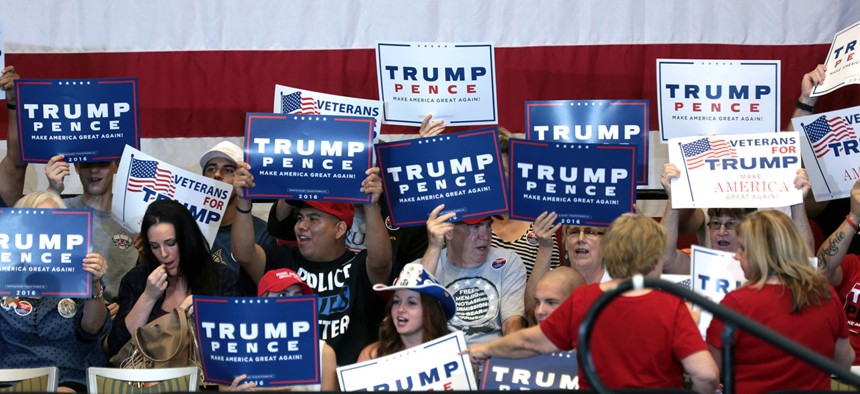
Flickr user Gage Skidmore
Hope Is What Separates Trump Voters From Clinton Voters
Donald Trump's supporters haven’t necessarily lost a job to globalization. But they’re afraid they’re next.
It’s pretty clear who Donald Trump wants to help, because he names them at every rally. Miners. Steelworkers. Guys on the assembly line, whose jobs are either being stolen by the Chinese or strangled to death by Obama’s regulations. If globalization has put your livelihood in jeopardy, Trump wants you on his side. And given his sky-high popularity among white men without a college degree, I’d argue this pitch is gaining traction.
But here’s the weird thing: Folks in hard-hit industrial towns aren’t voting for Trump. When Michigan Republicans went to the polls in March, economists expected to see huge Trump turnout in areas with the most shuttered factories. Instead, they got the opposite: Trump’s support was strongest in towns that hadgained manufacturing jobs. He did about 20 percentage points worse in areas where layoffs were most intense. It was completely the opposite of what everyone expected.
Earlier this month, Gallup economist Jonathan Rothwell published a working paper expanding the Michigan analysis to the entire country. This time, he used opinion poll results instead of vote totals, making the data more current. Rothwell found the same trend: Trump did worse in towns that lost manufacturing jobs between 2000 and 2007, and better in areas that gained them. Indeed, Trump is most popular in prosperous areas. Apparently, economic pain doesn’t guarantee votes for the Republican nominee, and economic success is no guard against him.
I’d argue the real dividing line is optimism. Consider this: Two-thirds of Hillary Clinton’s supporters think the next generation will be in better shape than we are today, or least the same, according to Pew Research. The reverse is true for Trump’s camp. Sixty-eight percent of his supporters think the next generation will be worse off. What’s more, the vast majority of Trump voters say life is worse today for people like them than it was 50 years ago. Only two percent —two!— think life is better now and that their children will also see improvement.
What we’re seeing is a hope gap. And it turns out that hope isn’t necessarily linked to a person’s current circumstances. Folks living in a poor community can still believe their children’s lives will be better, and people working in a reasonably secure local economy can still despair for the future. Rothwell’s work suggests it’s the communities that have seen the least societal change that are most likely to support the New York billionaire—by and large, they have fewer immigrants, fewer lost jobs, fewer impacts from global trade. People who have lost something aren’t voting for Trump, at least not uniformly. It’s the people who think they’re about to lose something.
For some time, I’ve mulled over why the poorly educated love Trump. The knee-jerk response from many (college-educated) Hillary Clinton supporters is simple:They’re dumb! Or more politely, we’re smart! Those Trump people just didn’t get enough schooling, the unspoken logic goes, to see through the billionaire’s bluster. This is demeaning and demonstrably false; Plenty of folks without college degrees support Clinton, after all. But I’ve always thought the lack of higher education was a proxy for something else, what a mathematician would call a “transitive property.” It doesn’t cause Trump support on its own. But it creates a situation where electing the Republican nominee makes sense.
As it happens, high school graduates are the least hopeful Americans out there. Only a fifth think the next generation of Americans will have better lives, the lowest percentage of any demographic group, according to Pew. They’re also the most likely to think that they’d be better off living 50 years ago, when low-skill jobs in manufacturing were plentiful. And the picture for white high school graduates is probably even gloomier than Pew’s numbers show; their figures include black Americans, who are far more optimistic about the future and less nostalgic for the past. Could hope be the missing link between education and Trump?
So maybe it isn’t about education, or poverty, or jobs. A voter’s choice may instead be more closely linked to how optimistic they feel about the future. Trump’s supporters view the global economic policies of the modern world as a Pandora’s Box: bright and shiny on the outside, disastrous when uncorked. But Clinton’s voters might better remember the end of the Greek myth. Once all the demons had escaped into the sky, the story goes, only one thing remained behind. It was hope, fluttering and fragile.
(Image via Flickr user Gage Skidmore)






